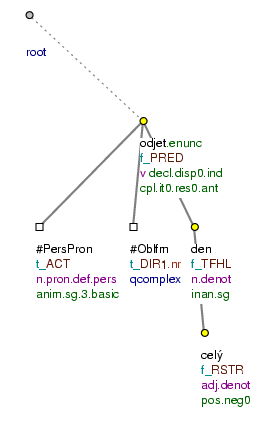- Definition of the
TFHLfunctor -
The
TFHLfunctor (temporal: for how long) is a functor for a free modification that expresses a temporal meaning related to the question "for how long?"; it gives the length of duration of a state which is a result of the event expressed by the governing word.
Modifications with the TFHL functor are usually expressed by direct specification of time (přijel na tři dni (=lit. (He) came for three days.)).
Forms. The basic forms of TFHL modifications are:
-
prepositional phrase.
The most common forms:
na+4 Přijel na tři dni. (=He came for three days.); práce na rok (=work for a year) po+4 Po dva dny se jí zúčastní i český ministr bez portfeje. (=For two days the Czech minister without portfolio will also take part.) pro+4 Byla přijata operativní opatření pro zbytek roku. (=Operational measures were accepted for the rest of the year.) Example:
Odjel na celý den.
TFHL(=lit. (He) left for all day.) Fig. 7.11 -
adverbial expressions.
Examples:
Je dlouhodobě.
TFHLnemocen. (=lit. (He) is (for) (a) long_term ill.)Používá se jen dočasně.
TFHL(=lit. (It) is used only temporarily.)Doživotně.
TFHLbudou mít nouzi. (=lit. Lifelong (they) will have need.)Na venkově bydlí natrvalo.
TFHL(=lit. In (the) country (he) lives permanently.)Odešel navěky.
TFHL(=lit. (He) left forever.)Navždy.
TFHLvám budu vděčný. (=lit. Always (to) you (I) will be grateful.)Bydlí tam přechodně.
TFHL(=lit. (He) lives there temporarily.)Výhledově.
TFHLje to zbytečné. (=lit. Prospectively is it useless.)
NB! A modification with the TFHL functor is usually not realized by a dependent clause. A similar temporal modification, modifying a noun, however, can be expressed by a dependent clause (its effective root node is assigned the RSTR functor), e.g.:
Půjčili jsme si od nich auto na dobu.TFHL, co budeme.RSTR na výletě . (=lit. (We) borrowed - - - their car for (the) time when (we) will_be on (a) trip.)
Agreeing form of an adjective. With nouns refering to events (i.e. nouns ending with -ní and tí; for details see Section 2.4.3.3, "Functors assigned to the non-valency modifications of nouns referring to events"), TFHL modifications can also be expressed by agreeing forms of an adjectives.
Examples:
kontejnery určené k dlouhodobému.TFHL uskladňování vyhořelého paliva z atomových reaktorů (=lit. containers reserved for long_term storage (of) burnt_out fuel from nuclear reactors)
dočasné.TFHL vyslání několika tisíc amerických vojáků do Chorvatska k ochraně mírových sil OSN (=lit. dispatch (of) several thousands American soldiers to Croatia to protect (the) peace forces (of) (the) UN)
Border with the TOWH functor. The TFHL functor is close both in its semantics and form to temporal modifications with the meaning "for when?" (see Section 3.6, "TOWH"). In a particular construction, however, no ambiguity arises. TFHL modifications refer to the length of duration of an event/state, to an interval; TOWH modifications, on the other hand, do not refer to the legth of duration, but rather to a moment in time. Cf.:
-
Odjel na celé pondělí.
TFHL(=lit. (He) left for (the) whole (of) Monday.)Přijel na půl.
TFHLměsíce (=lit. (He) came for half (a) month)práce na (celý) rok.
TFHL(=lit. work for (the) whole year) -
vstupenka na pondělí.
TOWH(=lit. ticket for Monday)Na příští měsíc.
TOWHsi nic nenaplánoval. (=lit. For (the) next month (he) - anything has_not_planned.)práce na příští rok.
TOWH(=lit. work for (the) next year)
Borders with other functors. The TFHL functor can also border on functors for other than temporal meanings (due to the similarity in form). However, the choice of the functor in a particular context is usually unambiguous. Cf.:
-
Přijel do Prahy na celou dovolenou.(=lit. (He) came to Prague for all (his) holiday.)
In this context, the modification na celou dovolenou (=lit. for all (his) holiday) expresses the legth of the stay and the effective root node is assigned the
TFHLfunctor. -
Přijel do Prahy na dovolenou. (=lit. (He) came to Prague on holiday.)
The modification na dovolenou (=lit. on holiday) expresses rather the purpose than the lenght of the stay in Prague. Hence, it is assigned the
INTTfunctor.
